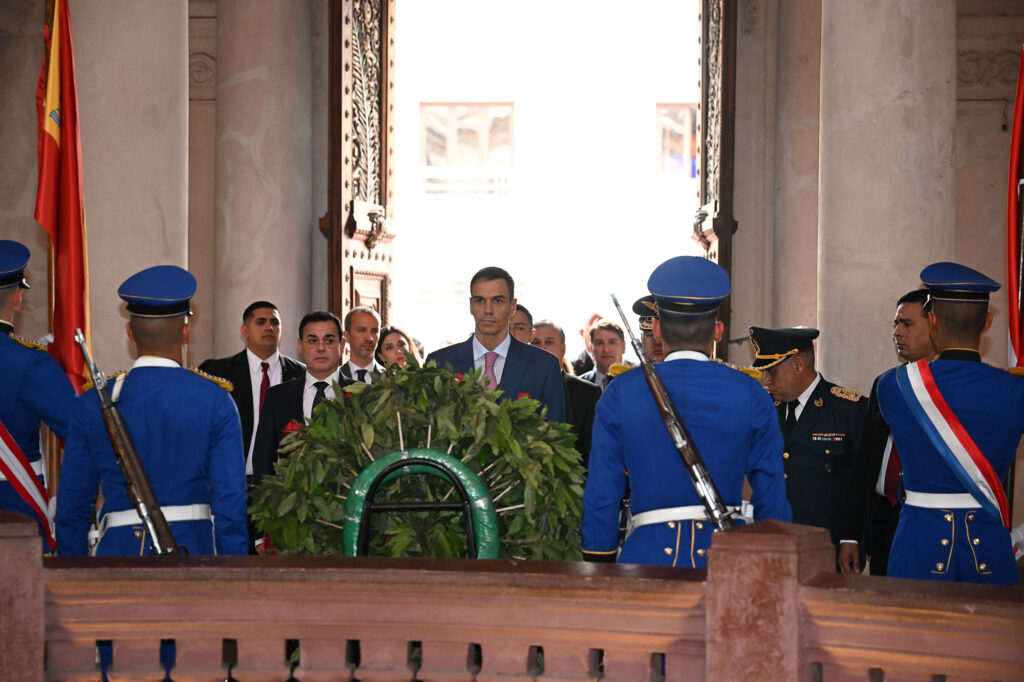González Barcos
The President of the Government, Pedro Sánchez, and the President of Paraguay, Santiago Peña, held a meeting at the Paraguayan Government Palace, where they agreed on the importance of promoting the early ratification of the European Union-Mercosur Agreement to consolidate the economic and strategic relationship between the two trading blocs.
The day began early with a floral offering at the National Pantheon of Heroes, the mausoleum where Paraguay’s great heroes rest. There, Sánchez paid tribute to “the Paraguayan people and their history of resistance,” as he later expressed on social media. The event marked the beginning of a busy institutional agenda, during which he was received with military honors by President Santiago Peña Nieto at the López Palace, the headquarters of the Executive Branch.
During the bilateral meeting, both leaders signed a circular migration agreement, designed to facilitate the arrival of Paraguayan workers to Spain under a framework of temporary employment, guaranteed labor rights, and agreed-upon return. The text, in line with the European strategy for regulated mobility, will allow hundreds of people to take on seasonal jobs in sectors such as agriculture, hospitality, and caregiving. “It is an agreement that benefits both parties and strengthens orderly and humane cooperation on migration,” Sánchez stated after the signing.
In addition, a cultural memorandum was signed with the aim of promoting exchanges in the areas of artistic creation, language, and artificial intelligence applied to cultural industries. The strengthening of the cultural dimension of bilateral relations was also reflected in the Spanish president’s visit to the house-museum of Josefina Plá, the Canary Islands-born writer and artist who became one of the great voices of 20th-century Paraguayan culture. “Culture is a bridge between our peoples, and Josefina Plá represents this with singular beauty,” the president noted.
On the economic front, the highlight was Sánchez’s participation in the Spain-Paraguay Business Forum, held in Asunción, which he attended accompanied by a delegation of more than twenty Spanish companies. Major companies such as Sacyr, Aena, Renfe, and Indra were present, as well as representatives of SMEs from the energy, infrastructure, and tourism sectors. CEOE President Antonio Garamendi led the business side of the delegation, reaffirming the commitment of the Spanish business community to the Latin American market.
Sánchez encouraged companies to consolidate their presence in Paraguay, highlighting its macroeconomic stability and its potential as a “regional platform for sustainable investment.” In his speech, he advocated a foreign policy that combines the interests of the state with those of the productive sector: “The best economic diplomacy is one that generates shared benefits: growth for our companies and development for our partners.”
In this context, the Spanish president once again firmly defended the need to urgently conclude the EU-Mercosur agreement, which has been under negotiation for more than two decades and whose political text was finalized in 2019, but whose ratification remains blocked. “Europe cannot afford to look the other way. This agreement is not just a commercial one; it is strategic for both blocs. It must be an instrument of prosperity, sustainability, and dialogue between like-minded regions,” emphasized Sánchez, who had already reiterated the same message during his previous stops in Santiago de Chile and Montevideo.
Paraguay—an active member of Mercosur—fully agreed with the position. President Santiago Peña reiterated his confidence that Spain will play a catalytic role within the EU to unblock the ratification of the agreement. “With partners like Spain, we have the opportunity to build a new chapter in a fairer and more balanced transatlantic relationship,” Peña told local media.
